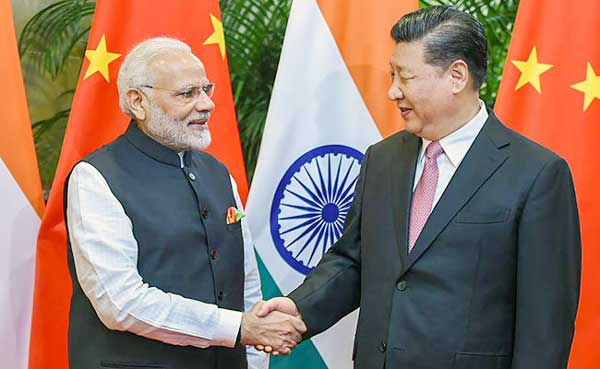A senior Chinese diplomat in India has underscored the need for New Delhi and Beijing to work jointly to counter the trade protectionism being practised by US President Donald Trump. The US imposed tariffs worth US$200 billion on Chinese imports in September, while China retaliated with tariffs of US$ 60 bn on US imports. Washington has threatened to impose further tariffs. The US trade deficit vis-à-vis China reached US$34.1bn for September (against US$31 bn in August 2018). Critics point to this increasing trade deficit as reiteration of the fact that Trump’s economic policies are not working.
Ji Rong, spokesperson of the Chinese Embassy in India, said on October 10 that tariffs would be detrimental for both India and China and, given that both countries are engines of global economic growth, it was important for both to work together.
Trump, on October 2, referred to India as ‘tariff king’. Even though the India-US strategic relationship has witnessed a significant upswing, Trump has repeatedly referred to India imposing high tariffs on US exports (specifically Harley Davidson motorcycles).
Ji’s statement came days after India signed a deal with Russia for the purchase of 5 S-400 air defence systems.
India and China started a joint training programme for Afghan diplomats on October 15 (which would last till October 26).
Trilateral cooperation between India, China and Afghanistan was among the main thrust areas of the Wuhan Summit between Chinese President Xi Jinping and Indian Prime Minister Narendra Modi. Joint training of Afghan diplomats is a key initiative in this direction.
Several factors have resulted in New Delhi and Beijing seeking to reset their relationship. The first is differences between India and the US on economic ties between New Delhi and Iran and Russia. Washington has given mixed signals about granting India exemption from the Countering American Adversaries through Sanctions Act (CAATSA).
While sections of the US establishment, especially Defence Secretary Jim Mattis and Secretary of State Michael Pompeo, have fervently backed a waiver for India, National Security Advisor John Bolton is opposed to any waiver, even for India. Trump himself has been unclear on the issue. When asked, he said India would know soon about the US decision.
A State Department spokesperson also said the US was carefully watching the S-400 agreement with Russia, as well as India’s decision to import oil from Iran, and such steps were ‘not helpful’. With Trump excessively transactional in his dealings, it is difficult to predict his final decision.
India, while strengthening strategic ties with the US, is concerned about the Trump administration’s economic policies. Speaking at the recent Shanghai Cooperation Organisation’s ministerial meeting in Tajikistan, Indian Foreign Minister Sushma Swaraj pitched for an open global trading order, saying, “We have all benefited from globalisation. We support an open, stable international trade regime based on centrality of the World Trade Organization.”
Even looking beyond Trump’s unpredictability, there is scope for synergy between New Delhi and Beijing in the economic sphere. India’s trade has been skewed in favour of China, and this is a growing concern. The trade deficit between India and China has risen from US$51.1 bn in 2016-2017 to 62.9 bn in 2017-2018 (a rise of over 20 percent).
The imposition of US tariffs has opened up opportunities for China to import commodities from India, like soyabean and rapeseed meal.
Another area of scope for cooperation is major connectivity projects. During his India visit, Uzbek President Shavkat Mirziyoyev invited India to participate in a rail project connecting Uzbekistan and Afghanistan.
Afghanistan welcomed this proposal, saying it would strengthen cooperation between China and India in Afghanistan. India-China cooperation on this project is in sync with the China-India Plus Model proposed by China at the BRICS Summit in July 2018.
India and China can also work jointly to build capacity in Afghanistan, where New Delhi is deeply involved in institution building and capacity building. India and China can also look at joint scholarships to Afghan students.
For any meaningful cooperation in Afghanistan, Beijing and New Delhi cannot be risk averse and will have to shed some inhibitions. While Kabul expected both countries to invest in a significant infrastructure project, Beijing has, with an eye on its ally Islamabad’s sensitivities, opted for a low profile project.
New Delhi should not be too predictable in its dealings with Washington and has to do a balancing act between Beijing and Washington.
While there are synergies on certain strategic issues between India and the US, there are serious differences on crucial economic and geo-political issues. India’s ties with China are crucial in this context.
New Delhi and Beijing should seek to expand economic ties, and the latter should give more market access to Indian goods. If both sides build trust, the sky is the limit, but this will require pragmatism from both sides. Beijing should not allow the Pakistani ‘deep state’ to dictate its links with India, especially in the context of cooperation in Afghanistan. New Delhi should not make any one issue a sticking point in its complex but crucial relationship with Beijing.





